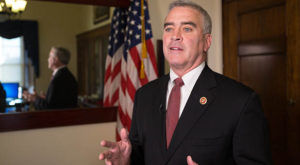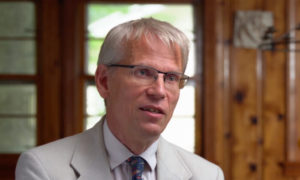‘Worst Public Health Mistakes in History,’ Witness Tells Covid Pandemic Oversight Committee
The House Select Subcommittee on the Coronavirus Pandemic presented the testimony of four public health experts, including Martin Kulldorff, Ph.D., who described the U.S. government’s response as the “worst public health mistakes in history.”
Convening for the first time on February 28, 2023, the Select Subcommittee on the Coronavirus Pandemic presented the testimony of four public health experts, as part of a roundtable: “Preparing For the Future By Learning From the Past: Examining Covid Policy Decisions.”
The agenda for the subcommittee, chaired by Rep. Brad Wenstrup (R-Ohio), focused on government policy pertaining to covid-19, including vaccine mandates and other public health guidance.

In his opening remarks, Wenstrup said the subcommittee will examine the origins of covid-19, policies surrounding gain-of-function, research, the impacts of lockdowns and other government policies, including school closures, and “vaccine and therapeutic development and the subsequent mandates.”
“We are here to deliver an after-action review of the past three years,” said Wenstrup. “To learn from the past, not just what went wrong, but what was done right, and to prepare for the future. This is work that needs to be done, should be done thoroughly, and with reverence with an eye toward the truth and based on facts.”
The experts who testified included Jay Bhattacharya, M.D., Ph.D., professor of medicine at Stanford University; Martin Kulldorff, Ph.D., professor of medicine at Brigham and Women’s Hospital; Marty Makary, M.D., M.P.H., chief of islet transplant surgery and professor of surgery at Johns Hopkins University; and Georges C. Benjamin, M.D., M.A.C.P., executive director of the American Public Health Association.
‘Worst public health mistakes in history’
In introducing the experts, Wenstrup said they can “help us chart a path forward; to help us understand what policies went wrong and how we, as a country, can improve.”
Wenstrup cited examples like the vaccine mandates imposed by the Biden administration, ignoring natural immunity, the harm caused to elders forced into nursing homes, and the consequences of stopping in-person learning and implementing remote work, particularly in the public sector.
“The American people deserve to know and understand how and why these impactful decisions were made,” said Wenstrup. “Did we create unnecessary fear in some, and dangerous ambivalence in others?”
“At the end of this process, our goal is to produce a product, hopefully bipartisan, based on knowledge and lessons learned,” he stated.
Ranking member Rep. Raul Ruiz (D-Calif.) focused on American lives lost during the pandemic, stating that it “was real and not a hoax” and “laid bare vulnerabilities and inequities in our public health infrastructure and our economy.”
“We need to understand the lessons, learn all the barriers of misinformation, disinformation, the politicization of this and avoid those for the sake of our nation, in order to save more lives,” Ruiz said.
Most of the witnesses shared critical words about the overall public health response to covid-19, which Kulldorff described as “the worst public health mistakes in history.”
Makary said “public health officials have made many tragic mistakes during the pandemic,” including:
“Ignoring natural immunity, dismissing the lab leak as a conspiracy, closing schools, masking toddlers, pushing boosters for young people, bypassing FDA [U.S. Food and Drug Administration] expert panel customary votes that we’ve been using for decades, telling people to wash their hands like crazy.”
Bhattacharya said:
“The American people deserve answers to fundamental questions about the pandemic. On what empirical basis were schools closed? Did public health decision-makers consider the harms of their policies as thoroughly as their putative benefits? Why did authorities ignore recovered immunity or failure of the vaccine to prevent disease transmission?”
“Scientists and people vehemently disagreed about the wisdom of lockdowns, school closures, vaccine mandates and discrimination and so much else,” he added. “There’s near-universal agreement that what we did failed.”
Benjamin, the only expert who was generally supportive of the overall public health response, said, “We need to remember the limited information we had when we made those decisions, and also the fact that our knowledge base and science continues to evolve over time.” He added, “We created a safe and effective vaccine by every standard that we understand safety and efficacy today, in record time.”
Wenstrup praised the quick development of vaccines, describing it as “amazing,” but added, “but we knew from the trials that even people that were vaccinated got covid” and “we also knew that vaccines produce variants and we should be expecting that.”
Citing the early public health response focusing on covid-19 at the expense of other patients and health issues, he said one of his constituents, an elderly man, had an operation for “a painful hernia” canceled, ultimately resulting in his death.
Several experts addressed this type of inflexibility. Makary said that while “public health officials are not wrong for making recommendations based on the knowledge that they had at the time, that’s not actually what occurred.”
“They were wrong because they refused to evolve their positions as the data became abundantly clear,” he said.
Nursing home policies, hospital visitation restrictions ‘a human rights violation’
Kulldorff said one of the two “major failures” of the public health response was “the failure to properly and optimally protect older Americans,” including “nursing home residents.” He described “sending sick people to nursing homes” as “criminal.”

“We also didn’t protect older working-age Americans in their 60s and 70s, while the ‘laptop class’ was often working from home, whether they were in their 20s or 30s or 40s,” he said. “The way we dealt with the pandemic was the worst assault on poor people, working Americans, the middle class since segregation and the Vietnam War.”
Kulldorff, who along with Bhattacharya helped draft the “Great Barrington Declaration” on “the damaging physical and psychic health impacts of the prevailing covid-19 policies,” said that when the group “proposed very concrete things for how to better protect older Americans” they were “slandered.”
Bhattacharya, in turn, said “the public health establishment abandoned an essential commitment to science” in “sending covid-19-infected patients back to nursing homes.”
Experts also addressed broader restrictions on hospital visitation during the pandemic. “To date, no randomized controlled trial has been conducted against the cruel and inhumane hospital visitation policies that prevented people from seeing their dying loved ones,” said Makary, who described this failure as “a human rights violation.”
‘A house of cards that’s now falling apart’
Several of witnesses focused on pandemic lockdown policies.
According to Bhattacharya, “By early 2022, about 95% of Americans had contracted covid, despite the harsh countermeasures in most states.”
Bhattacharya described the policies as a “widespread violation of civil liberties.” He referenced a “Johns Hopkins University meta-analysis [finding] that lockdowns had failed to contain the spread of covid.”
“At best, [lockdowns] temporarily protected the ‘laptop class’ who could work from home without losing their jobs, perhaps 30% of the population, while being served by the working class,” he added.
Kulldorff said such measures were themselves responsible for many deaths.
“Lockdown harms, school closures, people not going to medical visits has killed many Americans and will continue to do so in the next few years,” he said, adding that “the lockdowns had enormously negative consequences on public health.”
For example, screening and treatment on cardiovascular disease and other ailments “plummeted,” Kulldorff said.
“The pandemic response is a house of cards that’s now falling apart,” he added.
Several of the experts focused on school closures, with Kulldorff stating, “I don’t think there’s anybody left who thinks that school closures were a good idea.”
Bhattacharya said school closures helped create “tremendous collateral harm” and “have set kids behind in ways that will lead them to worse outcomes as adults, including shorter, poorer lives.”
Mandates ‘ignored clear scientific data’
Bhattacharya questioned why “public health authorities ignore[d] clear scientific data that covid infection [and] acquired immunity is as strong or stronger than vaccine-acquired immunity.”
“Vaccine mandates forced many frontline workers to choose between their careers and a vaccine that provides less protection than the natural immunity they already had,” he said.
According to Makary, “Young healthy people were essentially spared from this pandemic,” with “an infection fatality rate no worse than influenza.” However, he said, the Centers for Disease Control and Prevention (CDC) denied knowledge of studies confirming these findings.
Benjamin said, “We were all kind of surprised the kids did kind of well,” although “there were some children that got multisystem inflammatory syndrome.”
Makary took a different view, saying, “The greatest perpetrator of misinformation during the pandemic has been the United States government” when it claimed “vaccinated immunity was far greater than natural immunity” and that “masks were effective.”
Makary referred to the recently published Cochrane meta-analysis showing that masks did not prevent the spread of covid-19 while pointing out that myocarditis is “four to 28 times more common after the vaccine” but that the government has said “young people benefit from a booster.”

Kulldorff referred to the example of Sweden, describing it as the “one Western country who did very well during the pandemic” and that had “mostly voluntary measures” and a “very light approach,” instead of lockdowns and mandates.
“Sweden, together with other Scandinavian countries, [had] the least excess death in the world,” said Kulldorff.
Prompted by Rep. Mariannette Miller-Meeks, M.D. (R-Iowa), who said, “It wasn’t until I came to Congress that I found out infection-acquired immunity was a novel concept,” Kulldorff stated, “I guess we knew about it since 430 B.C., the Athenian Plague, until 2020, and then we didn’t know about it for three years, and now we know about it again.”
Makary said that since the time of the Athenian Plague, natural immunity had been observed, “and yet it was considered a conspiracy theory or something we couldn’t trust or believe in because we didn’t know the long-term protection. Well, we didn’t know the long-term protection of the vaccines either.”
“There has not been recognition that there is immunity after having had an infection,” said Kulldorff. There “was never a reason to mandate that vaccine for people that all had covid. There was recently a study of mass vaccinations that shows [they] had zero or very little benefit.”
Benjamin, however, argued that in terms of natural immunity, “We generally don’t do that in medicine, particularly when we have a therapeutic option that will prevent it.”
“Many faced with these anti-scientific choices will never trust public health authorities again,” Bhattacharya said. “Public health bureaucrats operated more like dictators than scientists during the pandemic, sealing themselves off from credible outside criticism.”
As a result, said Bhattacharya, “I’ve seen a rise in vaccine hesitancy for essential vaccines like measles [and] DPT,” describing this as “quite alarming.”
Kuldorff concurred. “By forcing children to have a vaccine that they don’t need because they’ve already had the disease, that undermines the trust in other vaccines,” he said, characterizing this as “very, very serious.”
Kulldorff said, “These failures are due to abandonment of basic principles of public health,” including an exclusive focus on one disease at the expense of all others, and “trying to suppress or eradicate covid, which was impossible.”
Makary asked, “Why do we have the same policies for everybody?” He noted the “biases” of covid-19 policy decision-makers, whom he described as “a small, non-diverse group making all the decisions, and they were HIV researchers” even though “in HIV, there’s no natural immunity.”
“CDC and the FDA and people at the NIH [National Institutes of Health] made their decision before the trials were completed,” said Makary. “They decided babies were going to get vaccines before the study was done. And then [they] found no statistically significant difference in efficacy between the two groups and they just authorized it anyway.”
“Why are we even doing trials? Why do we even have an FDA?” asked Makary.
Where do scientists whose careers were destroyed go to get their reputations back?
Ruiz said, “We are still dealing with the long-term implications of this public health crisis,” citing “the spread of misinformation or disinformation” as having “undermined the American people’s trust in our nation’s public health institutions and in each other.”
Ruiz said “misinformation” and “disinformation” may “lead to non-compliance or failure of therapeutics where people are making decisions that put themselves and their families in harm’s way.” But most of the experts took a different view.
Bhattacharya said that “under the banner of combating misinformation, government health agencies use their power to collaborate with social media companies to control the public conversation about covid science and policy,” noting that he was put on a “trends blacklist” by Twitter as a result, leading to his participation in a lawsuit against the Biden administration based on censorship claims.
“I personally have faced censorship,” Bhattacharya said, “from government sources during the pandemic, including slander and denigration. You need to involve outside voices respectfully in order to get the full set of people or else bad decisions will get made, just as they were during this pandemic,” he added.
Kulldorff referred to the Great Barrington Declaration, saying that when it was presented, he and its authors were “slandered instead of taking it seriously,” while Bhattacharya said there was “a media campaign to take down our proposal, which tens of thousands of doctors, epidemiologists and scientists endorsed.”
“Where do the scientists whose careers were destroyed go to get their reputations back?” he asked.
While Benjamin claimed, “There are many people out there who have a large bullhorn who have made it worse,” he conceded that “nobody should be censored.”
yogaesoteric
April 5, 2023
